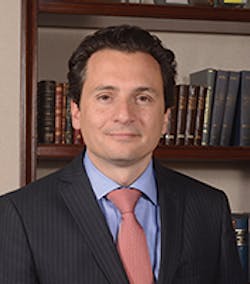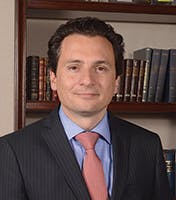Mexico: Bold Pioneers of the New Energy Future
THIS SPONSORED SUPPLEMENT WAS PRODUCED BY FOCUS REPORTS.
Publisher: Ines Nandin
Coordinator: Alina Cotfasa
Contributions: Mariuca Georgescu & Angelo Basurto.
Photo Courtesy: Manuela D' Andrea
For exclusive interviews and more info, plus log onto energyboardroom.com or write to [email protected]
After decades of holding a monopoly on both exploration and production in Mexico, Pemex, the country's NOC, will be just one of many companies bidding for blocks, thanks to the country's energy reforms bill formally becoming law on December 21st, 2013. Fifteen months later, and despite oil prices dropping to less than USD 50 per barrel, Mexico decided that it would still press on with its historic auction of offshore blocks. "The plunge in the price of oil is not negatively affecting the global interest in Mexico's energy industry opening, since we have production and development costs that are far below the price of oil, at USD 22 per barrel," explains Emilio Lozoya Austin, CEO of Pemex. "This makes Mexico a very attractive location to invest in." On December 12th 2014, Mexico's energy sector took a major first step towards private investment when it opened bidding on 14 shallow water exploration and production contracts, covering 4,222km2 in Mexican territorial waters.
However, while the exuberance currently electrifying the Mexican oil and gas sector is perhaps justified given developments over the last year, these new companies would do well to remember that a brave new world is dawning in Mexico, and the expertise of the old guard may not prepare companies sufficiently for new frontiers - a lesson that can be learnt from OGX in Brazil, among others.
Democratizing the Energy Reforms
In recent decades, Mexico has done little to bust the monopolies and oligopolies that stunt the country's growth. The state's control of the energy sector, as well as private monopolies in other strategic sectors including telecommunications, have translated into increased basic costs for Mexicans by some 40 percent according to OECD estimates, although, as Lozoya points out, "Pemex's efforts end up building one out of every three schools, one out of every three hospitals, one out of every three kilometers of roads that are built." Indeed, with the opening up of the energy sector, the Peña Nieto administration has taken bold steps to act on the mandate for change that was handed to it in the last presidential election, and has made significant progress to dismantle these concentrations of economic power. Leveling the economic playing field will undoubtedly help to boost Mexico's development, particularly that of small and medium-sized enterprises, the job creators in most economies.
Some, however, have pointed out that at face value, it is big business that is far better positioned to benefit from the opening of the Mexican oil industry as a result of the size of the required investment. "The reforms represent a huge challenge for smaller and medium-sized Mexican companies," says Alejandro Fuentes Alvarado, director general of Detectores y Controladores Del Golfo S.A. de C.V. (DYCGSA). "Domestic businesses will be expected to compete with international businesses that, in some cases, will have a mix of technological, financial and experiential advantages over us. I see this as a challenge, but also as a great opportunity that we should leverage to the fullest."
Austin,CEO, PEMEX
Despite these challenges, it is evident that Mexican businesses are determined to rise to the challenge and are viewing the reforms more as an opportunity for growth, rather than a competitive threat. José Juan Altonar Reyes, director general of Altopetrum & General Oil de México, a domestic SME specialized in the provision of products and services in the area of solids and fluids control for the oil industry, shares his views about the opening up of the industry to international participation. "I most certainly view the reforms with great optimism. They represent a fantastic opportunity to develop our business into a stronger and more sustainable company."
Altonar goes on to explain how the liberalization of Mexico's energy sector will enable Mexican businesses like his to interact with international businesses, thereby exposing them to new ideas, ways of operating and doing business. "SMEs in particular, like Altopetrum, have a lot to gain," insists Altonar. "The reforms will incentivize us to develop the scope and capabilities of our businesses, effectively unlocking additional opportunities for us as we evolve."
Although large companies in Mexico have experienced a compound annual growth rate (CAGR) in dollar terms of 14 percent since 1993, the country has experienced mediocre growth in relationship to peer countries like Brazil over the same time period. However, after a rough 2014 plagued by high inflation, economists expect a gloomy year for Brazil, whose GDP is forecasted to shrink by 0.5 percent in 2015. In contrast, Mexico had a 2.1 percent GDP increase in 2014, forecasted to pick up to an encouraging annual average of 3.7 percent in 2015-19. Research suggests that these differences in performance are attributable to entrepreneurship and the growth of small and medium enterprises (SMEs).
"In the past, a handful of companies dominated the sector in its entirety," explains Altonar.
"The energy reforms and new regulations effectively allow for a larger market in terms of investors and investment levels. Increased spending across the entire value chain will translate into countless opportunities for domestic and foreign businesses, small and large." It also translates into cash for state coffers. "Overall, as a result of the energy reform, Mexico expects to attract more than USD 50 billion in new private and foreign investment by 2018, including about USD 32 billion via the new partnerships with outside companies," Lozoya explains.
From an Energy Reform to a mindset reform
After nearly eight decades of strict national control, with Pemex at the top of the pyramid, Mexican businesses will need to transform their mindset to adapt to the new energy reforms, which will entail a brand new way of doing business, a new set of standards when it comes to competitiveness, a new set of partners to diversify away from Pemex, and a new set of challenges for both Mexican and international companies. Business-as-usual in Mexico is changing fast.
José Miguel Aparicio Ferrer, CEO of Catermar de Mexico, agrees. "Change starts at home and from within and for us Mexicans, Pemex is home. Fortunately, newer generations of businessmen and leaders are heading the state giant. For many years, as the union exercised its strong influence over the national company; training and new comers were few and far in between. Over time, Pemex was drained of its experienced people and had many of its key positions taken up by inexperienced individuals, despite their best intentions."
However, Aparicio goes on to explain that "what we see today is a growing pool of newer generations that have both the skills and the eagerness to transform Pemex into a nimble 21st century oil company. So long as there is a shift in mentality and in the outdated business-as-usual ways, I am confident that the newer generations at the helm of Pemex can and will bring about real change."
"Pemex is conveying a message of transformation that is consistent with the principles of the energy reform," says Arindam Bhattacharya, Schlumberger's president for Mexico and Central America. "Indeed, international partners looking to take advantage of the opportunities in Mexico should listen to these messages carefully. Pemex, and the E&P industry as a whole, is communicating its desire for international participation and investment. Instead of being apprehensive of international competition, Mexico welcomes it."
Beyond Increased Production
Although one of the primary aims of the energy reforms is to reverse Pemex's stubborn decline in production, from 3.5 MMb/d a decade ago to approximately 2.4 MMb/d today, the NOC has the chance today to enhance investment efficiency and operational productivity across the entire value chain by introducing higher levels of competitive forces.
For instance, earlier in 2014, Pemex was forced to cut production forecasts to 2.35 MMb/d by the end of 2014 after it was revealed that aging production systems were counting some water as oil. This was unwelcome news for the NOC, as it had already cut its output target earlier in the year, forecasting that production would fall to 2.4 MMb/d at 2014 by year-end after appearing to stabilize for a number of months at around 2.5 MMb/d. In response to these issues, Pemex sought to discover the best international technologies and practices to measure hydrocarbon flow and quality by organizing its first ever 'Exhibition on Hydrocarbon Flow and Quality Measurement' in November 2014. As Primo Luis Velasco Paz, sub-director of distribution and marketing at Pemex and executive president of the Congress, puts it, "we intend to convey to both Pemex and businesses operating in that domain that we have hit the ground running and are prepared to make the necessary changes and investments to enhance our measurement accuracy and effectiveness made possible by the recently-introduced secondary laws."
Furthermore, he goes on to explain that Pemex is "looking to promote greater technological exchange among all businesses and attendees, in addition to Pemex's own employees, in order to raise awareness about the latest technologies and solutions. The topic of measurements and their implementation in Mexico is taking on an even greater importance in the domestic industry, particularly as a result of the energy reforms. Mexico's congress has made clear their objective to intensify technological exchange in the industry and this is precisely what the exhibition was about."
Alejandro Fuentes Alvarado, director general of DYCGSA, a Mexican company dedicated to the implementation of instrumented safety systems and measurement of hydrocarbons and attendee of the congress, shares Velasco's views. "Measurement is a very important area within the universe of the oil and gas business and this reform is bringing more and more projects each day," explains Fuentes. "In turn, this automatically translates into new business for our country. Businesses like DYGCSA must exert a constant effort and do their part to ensure that the country's infrastructure and operations are safe and efficient. The energy business model as we know it is based on the extraction and commercialization of oil and, to make that happen, previous measurements and calculations must be done and this is where we enter the picture. To put it bluntly, the more multinational companies want to enter the Mexican market, the more measurement must be done."
Fuentes explains that "Pemex is investing more in measurements each day as production decreases. They need to become more efficient at the extraction process to calculate everything carefully before doing any drilling begins. DYGCSA helps them to become more productive in this regard and thus more profitable."
Another area that the energy reform was created to address is energy sustainability and efficiency. As a Mexican company dedicated to providing integrated power generation solutions specifically to the oil and gas industry through the use of cutting-edge technology, Industrias Energéticas welcomes the energy reforms with open arms. The company is a recognized distributor for Capstone Turbine Corporation, the world's leading producer of low-emission MicroTurbine systems, and offers clients advanced power solutions associated with the high levels of efficiency and ultra-low emissions.
Although there is burgeoning global demand for such innovative green products, for Juan Carlos Hernández Nájera, director general of Industrias Energéticas, introducing these greener and more efficient technologies to Mexico has not always been smooth sailing. "One of our key challenges was convincing clients to use our products since they were more on the premium side of power generation solutions and the regulations to promote the use of cleaner sources of power were lacking," says Hernández. "Of course, we put a lot of effort into educating prospective clients not only of the environmental benefits of Capstone MicroTurbines, but also of their capacity to significantly reduce costs by reducing consumption as well as maintenance costs. With the enactment of the energy reforms, Mexico has made a meaningful shift towards more environmentally conscious solutions for the extraction and consumption of energy," declares Hernández.
In reference to a slew of energy sustainability regulations and funds introduced by the energy transition package, which contains laws promoting sustainability, Hernández is optimistic about Mexico's environmental footprint. "We are excited about the new regulations introduced by the energy reforms which seek to promote cleaner and greener practices," affirms Hernández. "The environmentally friendly legislation will finally put an end to the 'diesel-spilling' culture that prevailed in the past when companies opted, for example, use the cheapest equipment which often was extremely polluting and wasteful."
Free Advice / Partnership is Key
With a rich professional background in the international exploration business, José Miguel Aparicio Ferrer, CEO of Catermar de Mexico, an industrial catering and hospitality services company specialized in the oil industry, offers investors eager to participate in Mexico's emerging opportunities a simple piece of advice. "In the same way that travelers to new destinations first seek to sample the local foods and visit the cultural centers of the host country to see it for what it is, investors should seek to reform partnerships with established local businesses. Working directly with Mexicans is undoubtedly the best way of ensuring that investors become a part of the country's historic energy reforms."
Surely, investors should not take this advice lightly. In the past, Catermar de Mexico has successfully acted as the legal representative of several drilling companies, including most importantly Pride International for which Aparicio was the legal representative and commercial manager for about a decade while simultaneously heading his catering business. During that time, Aparicio successfully contracted Pride rigs to Pemex that generated USD 1.1 billion of revenues over that period of time. "Now more than ever," Aparicio states, "for those international players looking to be a part of the Mexican energy reforms, it's rather simple; work with Mexicans!"
When asked about the biggest obstacles facing international investors looking to penetrate the Mexican oil industry, Yann Kirsch, executive vice president of business development at Goimar, suggests that "it's perhaps the cross-cultural differences and language barriers that are toughest to overcome." Part of the Goimar-Goimsa Group, Goimar is an organization dedicated to the leasing and operation of drilling rigs and marine vessels to the oil and merchant sectors which attributes a lot of its success to the wealth of experience in partnering with international players.
"Goimar's operational seed," explains Kirsch, "stems from 2002 when we were responsible for operating a semi-submersible drilling rig owned by Sinopec, which was then managed by Maersk contractors. We worked in close collaboration with Maersk on operating that drilling rig, and represented only the start of many strategic alliances with international organizations to offer a variety of offshore drilling services." Since then, Goimar has successfully partnered with a variety of leading international players including one of Asia's largest marine companies - Pacific Richfield Marine, China Oilfield Services (COSL), Colombian-based Coremar and CROSCO from Croatia, among many others.
"We gained a lot from those experiences," boasts Kirsch, which have allowed them to overcome the intercultural barriers to partnering with international players. "We have managed to eliminate these barriers and introduce Pemex to different kinds of companies from around the world to service their needs and target various international tenders or projects in the market place."
Kirsch goes on to add that, "in many ways, we like to think of ourselves as that bridge connecting Mexico and Pemex to the global arena. Most often, the best strategy for any company to enter a new market is through local partnerships. Doing so allows investors to better navigate the unique characteristics of a given country's economic, financial, legal and political systems, among others."
Pre-Reform Innovation Done Right
Before the energy reforms became a reality in Mexico, Pemex was already starting to experiment with different ways to break out of its traditional business lines and try to explore new opportunities within the constraints of laws that governed it. One of the fruits born from this activity was Comesa: initially created to provide Pemex with cutting-edge seismic acquisition technology, Comesa is a majority state-owned business, but has proven much more agile than its parent company, which has left it able to rapidly capitalize on market insight and opportunities available. For example, by 2007, Comesa had expanded its capabilities from an exclusively onshore company to providing offshore exploration services in both shallow and deepwater plays; by 2012, the company had moved into a fully-fledged production company too.
For Gustavo Urdaneta, Director of Operational Services at Comesa, it was clear that the energy reform was a necessary step for the Mexican oil and gas sector. "It was rather obvious that Mexico needed the participation of private companies," he says. "Our country did not have enough money to invest in the oil industry and in the development of new fields. Pemex required a lot of help in technically difficult and complex areas, such as in the Gulf's deepwaters for instance. I can see that companies all around the world have their eyes on Mexico." He is hopeful that the reforms will mean positive developments for Comesa. "The conditions are ripe for a transparent relationship between us and multinationals. The rules of the game are clear and the stage is being set for a greater production of crude oil."
Although it might seem today as if the pre-reform Pemex had been languishing in the dark ages when it came to innovation, there are great examples to be found of the NOC leading the way. Jorge Luis González Velázquez, the brain behind Grupo de Analasis de Integridad de Ductos (GAID), is credited with raising global industry standards thanks to a project run together with Pemex for improving pipeline lifecycles. "Metallurgy has always been of great interest to me," González explains, which ultimately led him to improve Pemex's oil and gas pipelines, which often corrode and crack due to the high levels of sulfur in Mexican crude. The mathematical algorithms developed by GAID allow for precise calculation of the remaining strength and life of pipelines, which has allowed Pemex to save money and work more efficiently on maintenance in the years since it was introduced as a standard test.
González's novel model became a landmark in the relationship between academia and industry in Mexico, because the scientific methodology came to be regarded as a "discipline now called integrity assessment, which nowadays is the worldwide standard for managing every maintenance activity in the oil and gas industry as well as many other fields," he explains.
Pemex also for many years before the reform worked with leading oilfield service companies on a quasi-incentivized basis. For companies like Schlumberger, this was an opportunity to develop a new set of skills according to the demands of the market. "Over the past few years, Mexico has also become a key market for our Integrated Project Management (IPM) business," explains Bhattacharya of Schlumberger. "Being among the first oilfield service companies to offer IPM solutions, for over two decades now, Mexico was one of the countries where we started managing some of the largest projects; starting with the development of the Burgos basin in the north of the country, down to Chicontepec and further south to Villahermosa's basins which are well-known for their complexity. From an IPM perspective, Mexico is an important part of Schlumberger's portfolio and will continue to be so, particularly as deepwater projects gain momentum in the country.
What is Lozoya looking for?
Holding degrees in economics and law and a Master's in public administration and international development from Harvard, Emilio Lozoya Austin became the CEO of Pemex after heading the international affairs office for Peña Nieto during his campaign, and leading his transition team. He speaks to EnergyBoardroom about what Pemex is looking for from future international partners - for the full interview, log onto EnergyBoardroom.com.
Q: Beginning in 2015, Pemex is set to ink its first joint ventures with private and foreign oil companies. Generally speaking, what characteristics and attributes will Pemex seek in its partners as the company makes one of the first major action steps in its energy reform?
A: International oil companies and medium-sized oil companies across the world are very eager to work with us, because we are a leading global player, particularly in shallow waters. In deep water we have evolved technologically, and have a current success rate above 50 percent.
The oil industry needs to look at very long-term goals. Investment cycles in deep water are more than ten years, to recover the cost. In other types of reservoirs we might have longer or shorter term horizons.
But Pemex, considering that we have one single owner which is the State, has very long-term goals and very long-term investment cycles, and this is beneficial for our current and our potential partners.
With Round Zero we requested to retain exclusive rights to prospective oil resources of the areas we have the highest expertise. We will be focusing in the areas we have successfully been developing, but also have the opportunity to add joint ventures with other international oil companies to complement our investments.
In the end, our goal is to allow Petroleos Mexicanos to have enough reserves to ensure sustainability in the medium and long-term, while giving the market sufficient resources to develop through the private sector. We need to assure our company's growth and our place as a leader in the oil and gas industry in Mexico.
An IPO amidst the Reforms
C.I.C.S.A - Corporativo Industrial y Comercial S.A de C.V
"We began the process of analysis and evaluation to become a public company in June 2012, when the energy reforms were just a good idea, far from the reality that it is today," explains Andrés García Castillo, CEO of C.I.C.S.A, a company specialized in cranes for the offshore segment. He believes the energy reforms will provide solid growth to his company, based on the fact that "the potential pool of clients which we can offer our services is sure to expand, thereby increasing our long term commercial opportunities and overall business sustainability."
Do such listings mark a shift in the way that Mexican offshore service companies will do business, now there will be more than just Pemex as a client? "There were several objectives to listing the company," García explains. "As well as giving us better access to financing, preparing for the listing also allowed us to institutionalize and better define process and access to quality information. The shift to corporate governance will help us develop and grow in the long term. We believe that everyone-from partners and customers to suppliers, financial institutions and our own employees-will benefit from a company that operates in a more transparent manner."
According to García, "listing on the Mexican exchange by local businesses is limited, with less than 150 companies listed. In fact, C.I.C.S.A will be the first company based in the state of Campeche to be listed on the local market. Nevertheless, the relative underdevelopment and lack of experience in the listing market will cause us to incur generally higher costs, with restricted consulting and advisory resources that are more likely than not unsuitable for our specific needs." If more Mexican companies in the oil and gas industry wish to list, they may well have to face the same challenges.
Upping The Game
As the reforms are well into their implementation phase and the industry prepares itself for the wave of international investment and participation, many businesses are looking to professionalize their organization. One way in which they are doing so is by gaining internationally recognized certifications that would enable them to meet the requirements of international businesses.
A prime example of these is Catermar de Mexico, a Mexican company founded in 1993, with the purpose of providing world-class industrial catering and hospitality services to the terrestrial and maritime facilities of the Mexican oil industry.
With over two decades of experience under their belt, José Miguel Aparicio Ferrer, CEO of Catermar de Mexico, explains that, "since the very beginning, we have been keen to building Catermar into a company capable of competing in the international arena. As a consequence, we are the first Mexican company to in our field to earn ISO 9000 certification for quality management systems as early as 1998. Over the years, our ambitions continued to be strengthened by improving installations, training and the services we offer to clients. In fact, we are currently in the final stages of having integral certification that would include ISO 14000 certification which addresses various aspects of environmental management, as well as OHSAS 18000 occupational health and safety certification the ISO 22000 standards which addresses innocuity of food. These standards will all be integrated into our ISO 9000 certification to demonstrate our commitment to quality throughout the organization."
"Having embarked on a mission to professionalize Catermar and gain international accreditation some two years ago, we are ecstatic to have successfully reached our goal," revels Aparicio. "When we first started that process, many around us scoffed at our ambitions and never saw the long term benefit. Today, we know that Pemex will soon start mandate that its suppliers in our field have these very same certifications, giving us at least a couple of years' head start over those that chose not to invest in the development of their business. Sure, we have had to sacrifice a good proportion of our profits, but this was done in lieu of being there first."









